Essay on Patient's Access to Prohibitively Existing Treatments
VerifiedAdded on 2021/05/31
|5
|1128
|48
Essay
AI Summary
This essay delves into the critical issue of patient access to prohibitively existing treatments, focusing on the ethical dilemmas encountered within the nursing profession. It emphasizes the nurses' commitment to promoting the common good and providing selfless care, while navigating challenges such as high healthcare costs and the financial constraints of patients. The essay explores the concept of common good in healthcare, highlighting the difficulties nurses face in balancing societal well-being with organizational goals and the financial aspects of patient care. It references the global impact of unaffordable medical services, particularly for vulnerable populations in countries like Australia, Asia, and Africa. The essay underscores the importance of distributive justice in nursing, the challenges nurses face in promoting common good, and the ethical considerations involved in ensuring patient access to essential treatments. The essay concludes by emphasizing the nursing profession's dedication to serving humanity and the ethical dilemmas nurses face in their practice.
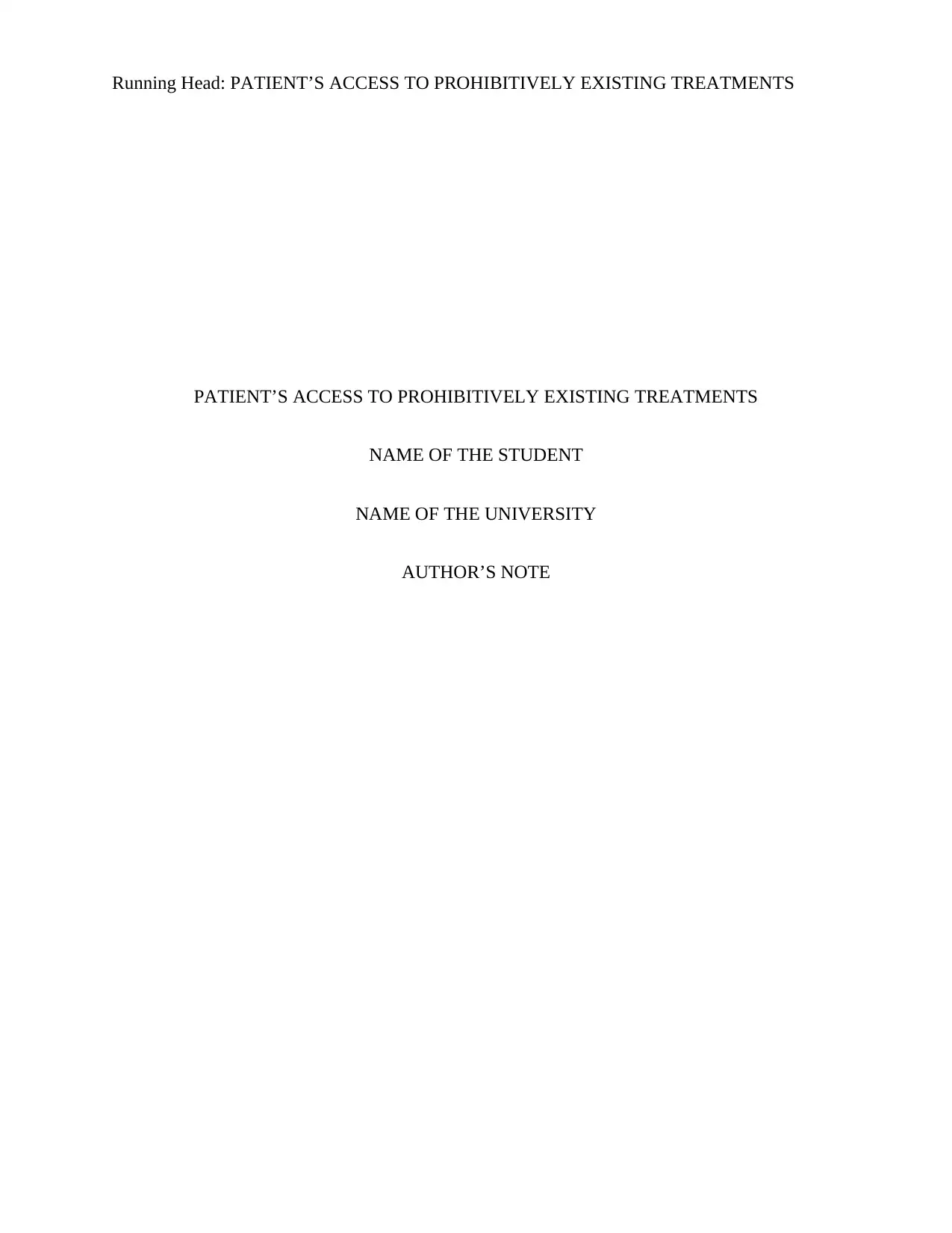
Running Head: PATIENT’S ACCESS TO PROHIBITIVELY EXISTING TREATMENTS
PATIENT’S ACCESS TO PROHIBITIVELY EXISTING TREATMENTS
NAME OF THE STUDENT
NAME OF THE UNIVERSITY
AUTHOR’S NOTE
PATIENT’S ACCESS TO PROHIBITIVELY EXISTING TREATMENTS
NAME OF THE STUDENT
NAME OF THE UNIVERSITY
AUTHOR’S NOTE
Paraphrase This Document
Need a fresh take? Get an instant paraphrase of this document with our AI Paraphraser
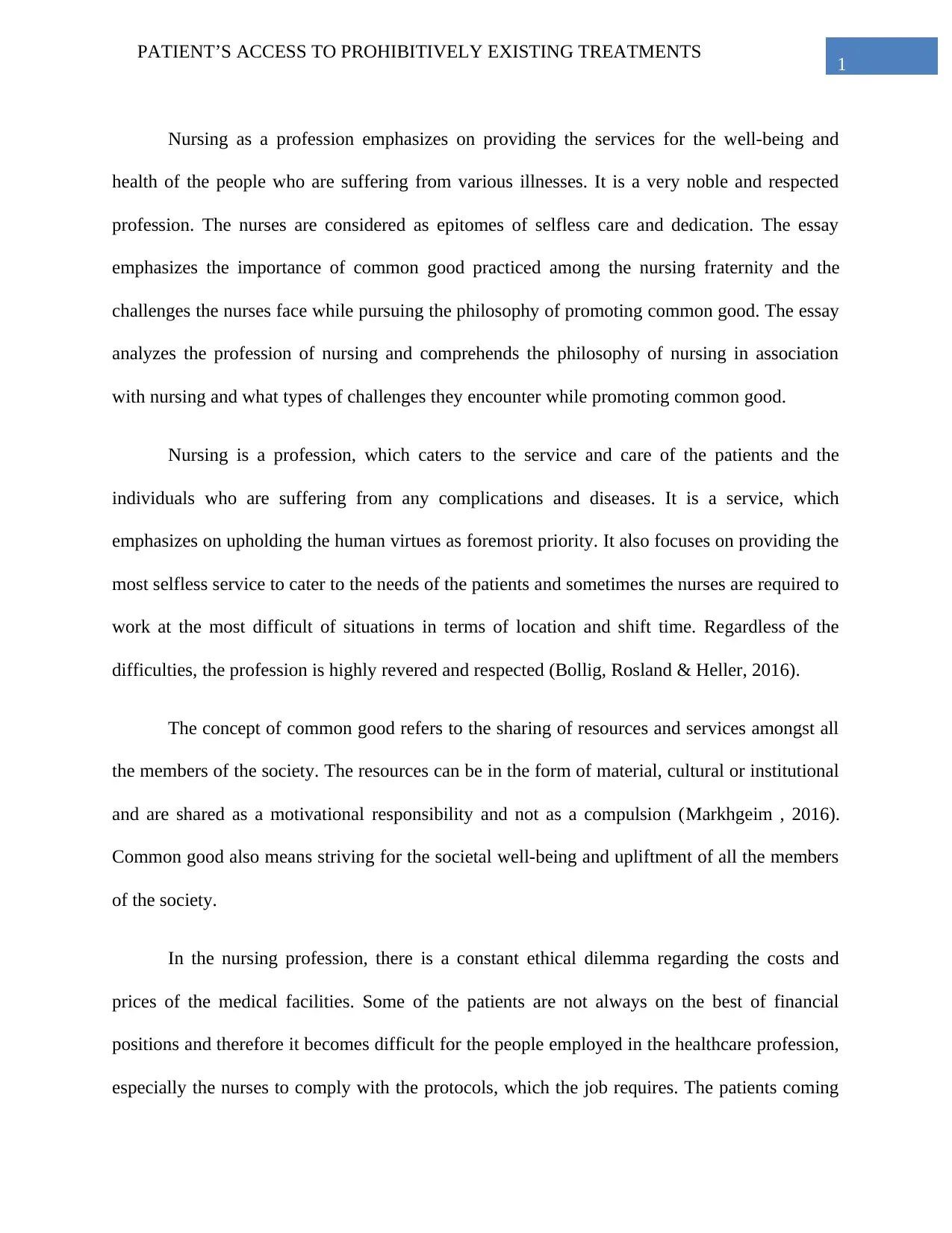
1
PATIENT’S ACCESS TO PROHIBITIVELY EXISTING TREATMENTS
Nursing as a profession emphasizes on providing the services for the well-being and
health of the people who are suffering from various illnesses. It is a very noble and respected
profession. The nurses are considered as epitomes of selfless care and dedication. The essay
emphasizes the importance of common good practiced among the nursing fraternity and the
challenges the nurses face while pursuing the philosophy of promoting common good. The essay
analyzes the profession of nursing and comprehends the philosophy of nursing in association
with nursing and what types of challenges they encounter while promoting common good.
Nursing is a profession, which caters to the service and care of the patients and the
individuals who are suffering from any complications and diseases. It is a service, which
emphasizes on upholding the human virtues as foremost priority. It also focuses on providing the
most selfless service to cater to the needs of the patients and sometimes the nurses are required to
work at the most difficult of situations in terms of location and shift time. Regardless of the
difficulties, the profession is highly revered and respected (Bollig, Rosland & Heller, 2016).
The concept of common good refers to the sharing of resources and services amongst all
the members of the society. The resources can be in the form of material, cultural or institutional
and are shared as a motivational responsibility and not as a compulsion (Markhgeim , 2016).
Common good also means striving for the societal well-being and upliftment of all the members
of the society.
In the nursing profession, there is a constant ethical dilemma regarding the costs and
prices of the medical facilities. Some of the patients are not always on the best of financial
positions and therefore it becomes difficult for the people employed in the healthcare profession,
especially the nurses to comply with the protocols, which the job requires. The patients coming
PATIENT’S ACCESS TO PROHIBITIVELY EXISTING TREATMENTS
Nursing as a profession emphasizes on providing the services for the well-being and
health of the people who are suffering from various illnesses. It is a very noble and respected
profession. The nurses are considered as epitomes of selfless care and dedication. The essay
emphasizes the importance of common good practiced among the nursing fraternity and the
challenges the nurses face while pursuing the philosophy of promoting common good. The essay
analyzes the profession of nursing and comprehends the philosophy of nursing in association
with nursing and what types of challenges they encounter while promoting common good.
Nursing is a profession, which caters to the service and care of the patients and the
individuals who are suffering from any complications and diseases. It is a service, which
emphasizes on upholding the human virtues as foremost priority. It also focuses on providing the
most selfless service to cater to the needs of the patients and sometimes the nurses are required to
work at the most difficult of situations in terms of location and shift time. Regardless of the
difficulties, the profession is highly revered and respected (Bollig, Rosland & Heller, 2016).
The concept of common good refers to the sharing of resources and services amongst all
the members of the society. The resources can be in the form of material, cultural or institutional
and are shared as a motivational responsibility and not as a compulsion (Markhgeim , 2016).
Common good also means striving for the societal well-being and upliftment of all the members
of the society.
In the nursing profession, there is a constant ethical dilemma regarding the costs and
prices of the medical facilities. Some of the patients are not always on the best of financial
positions and therefore it becomes difficult for the people employed in the healthcare profession,
especially the nurses to comply with the protocols, which the job requires. The patients coming
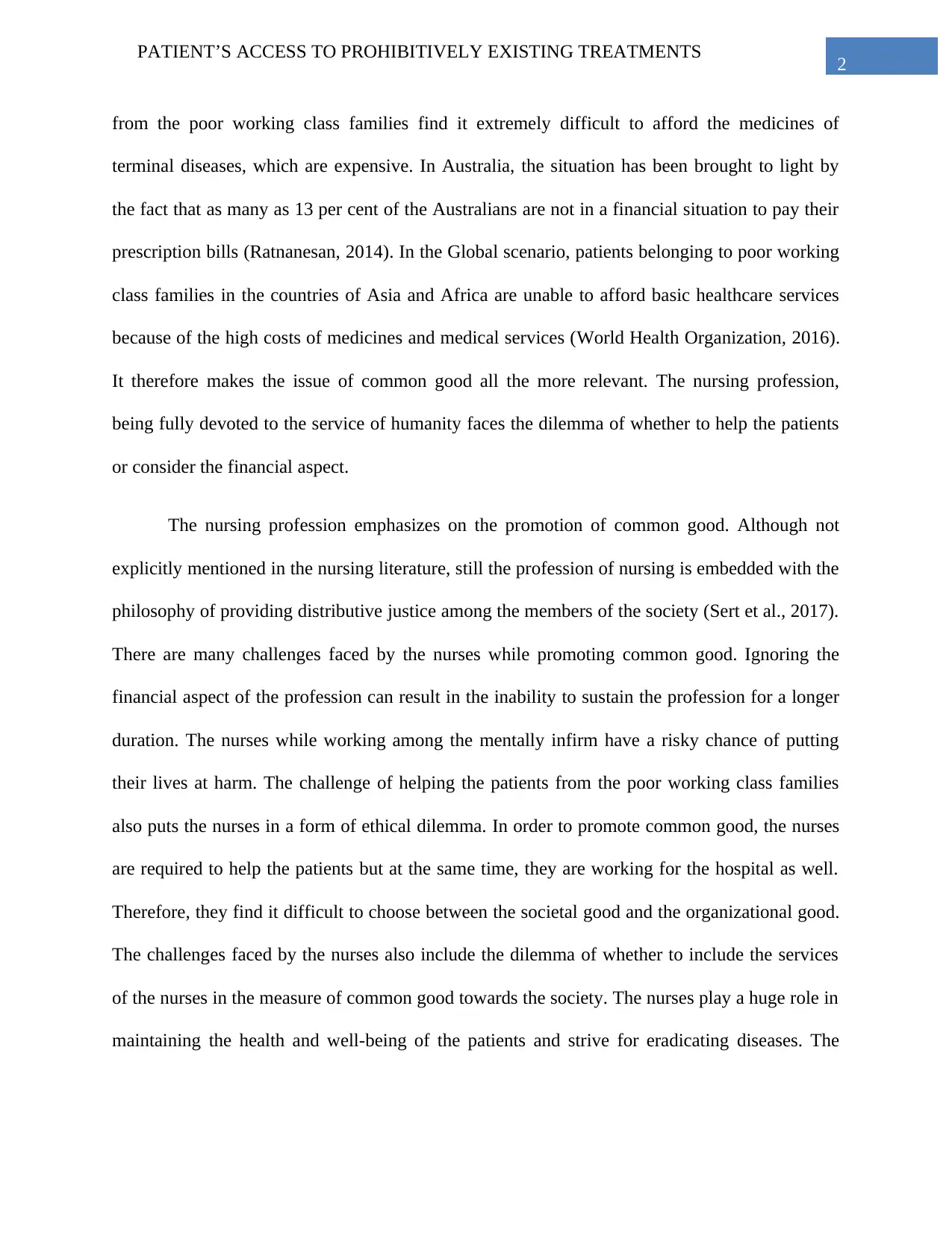
2
PATIENT’S ACCESS TO PROHIBITIVELY EXISTING TREATMENTS
from the poor working class families find it extremely difficult to afford the medicines of
terminal diseases, which are expensive. In Australia, the situation has been brought to light by
the fact that as many as 13 per cent of the Australians are not in a financial situation to pay their
prescription bills (Ratnanesan, 2014). In the Global scenario, patients belonging to poor working
class families in the countries of Asia and Africa are unable to afford basic healthcare services
because of the high costs of medicines and medical services (World Health Organization, 2016).
It therefore makes the issue of common good all the more relevant. The nursing profession,
being fully devoted to the service of humanity faces the dilemma of whether to help the patients
or consider the financial aspect.
The nursing profession emphasizes on the promotion of common good. Although not
explicitly mentioned in the nursing literature, still the profession of nursing is embedded with the
philosophy of providing distributive justice among the members of the society (Sert et al., 2017).
There are many challenges faced by the nurses while promoting common good. Ignoring the
financial aspect of the profession can result in the inability to sustain the profession for a longer
duration. The nurses while working among the mentally infirm have a risky chance of putting
their lives at harm. The challenge of helping the patients from the poor working class families
also puts the nurses in a form of ethical dilemma. In order to promote common good, the nurses
are required to help the patients but at the same time, they are working for the hospital as well.
Therefore, they find it difficult to choose between the societal good and the organizational good.
The challenges faced by the nurses also include the dilemma of whether to include the services
of the nurses in the measure of common good towards the society. The nurses play a huge role in
maintaining the health and well-being of the patients and strive for eradicating diseases. The
PATIENT’S ACCESS TO PROHIBITIVELY EXISTING TREATMENTS
from the poor working class families find it extremely difficult to afford the medicines of
terminal diseases, which are expensive. In Australia, the situation has been brought to light by
the fact that as many as 13 per cent of the Australians are not in a financial situation to pay their
prescription bills (Ratnanesan, 2014). In the Global scenario, patients belonging to poor working
class families in the countries of Asia and Africa are unable to afford basic healthcare services
because of the high costs of medicines and medical services (World Health Organization, 2016).
It therefore makes the issue of common good all the more relevant. The nursing profession,
being fully devoted to the service of humanity faces the dilemma of whether to help the patients
or consider the financial aspect.
The nursing profession emphasizes on the promotion of common good. Although not
explicitly mentioned in the nursing literature, still the profession of nursing is embedded with the
philosophy of providing distributive justice among the members of the society (Sert et al., 2017).
There are many challenges faced by the nurses while promoting common good. Ignoring the
financial aspect of the profession can result in the inability to sustain the profession for a longer
duration. The nurses while working among the mentally infirm have a risky chance of putting
their lives at harm. The challenge of helping the patients from the poor working class families
also puts the nurses in a form of ethical dilemma. In order to promote common good, the nurses
are required to help the patients but at the same time, they are working for the hospital as well.
Therefore, they find it difficult to choose between the societal good and the organizational good.
The challenges faced by the nurses also include the dilemma of whether to include the services
of the nurses in the measure of common good towards the society. The nurses play a huge role in
maintaining the health and well-being of the patients and strive for eradicating diseases. The
⊘ This is a preview!⊘
Do you want full access?
Subscribe today to unlock all pages.

Trusted by 1+ million students worldwide
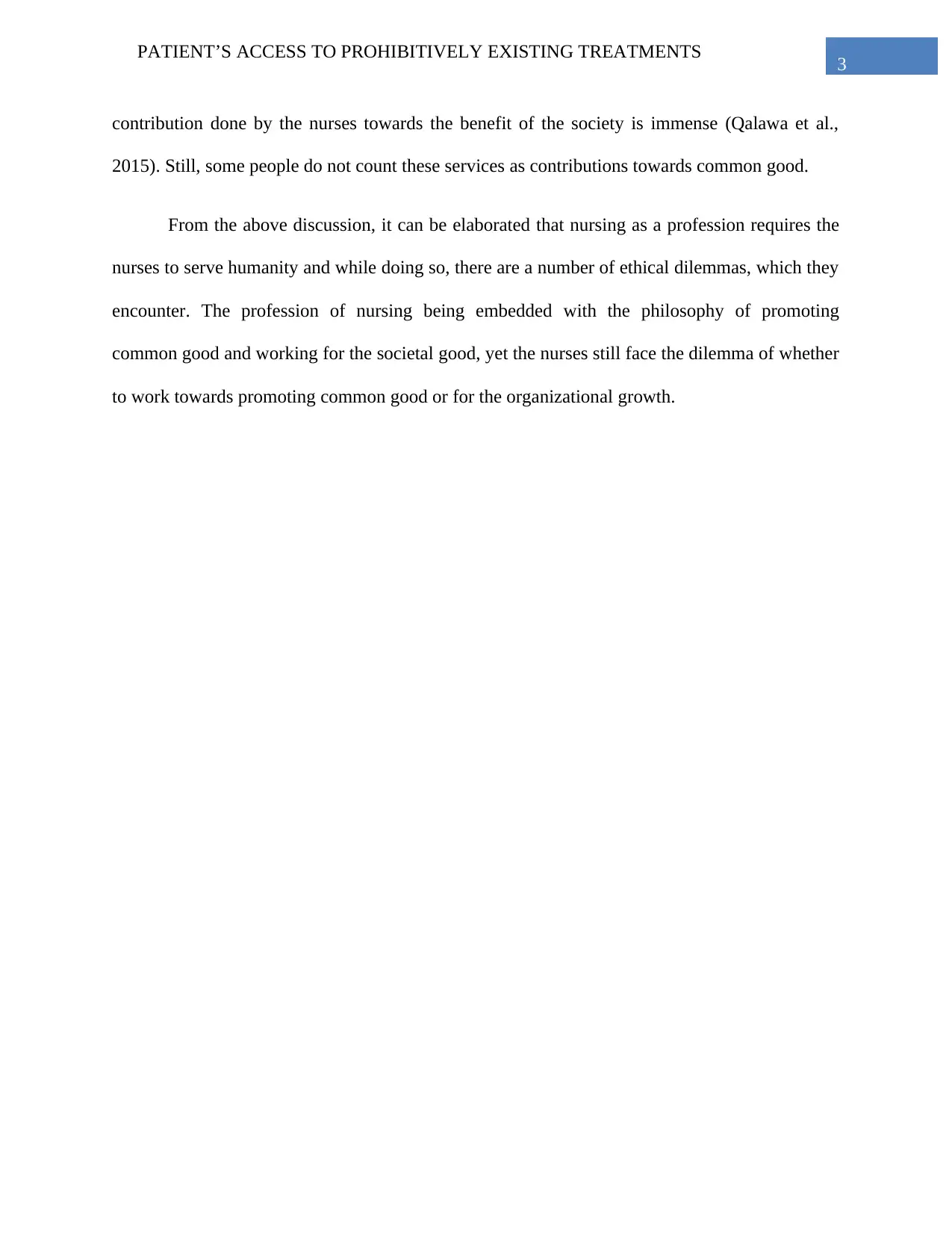
3
PATIENT’S ACCESS TO PROHIBITIVELY EXISTING TREATMENTS
contribution done by the nurses towards the benefit of the society is immense (Qalawa et al.,
2015). Still, some people do not count these services as contributions towards common good.
From the above discussion, it can be elaborated that nursing as a profession requires the
nurses to serve humanity and while doing so, there are a number of ethical dilemmas, which they
encounter. The profession of nursing being embedded with the philosophy of promoting
common good and working for the societal good, yet the nurses still face the dilemma of whether
to work towards promoting common good or for the organizational growth.
PATIENT’S ACCESS TO PROHIBITIVELY EXISTING TREATMENTS
contribution done by the nurses towards the benefit of the society is immense (Qalawa et al.,
2015). Still, some people do not count these services as contributions towards common good.
From the above discussion, it can be elaborated that nursing as a profession requires the
nurses to serve humanity and while doing so, there are a number of ethical dilemmas, which they
encounter. The profession of nursing being embedded with the philosophy of promoting
common good and working for the societal good, yet the nurses still face the dilemma of whether
to work towards promoting common good or for the organizational growth.
Paraphrase This Document
Need a fresh take? Get an instant paraphrase of this document with our AI Paraphraser
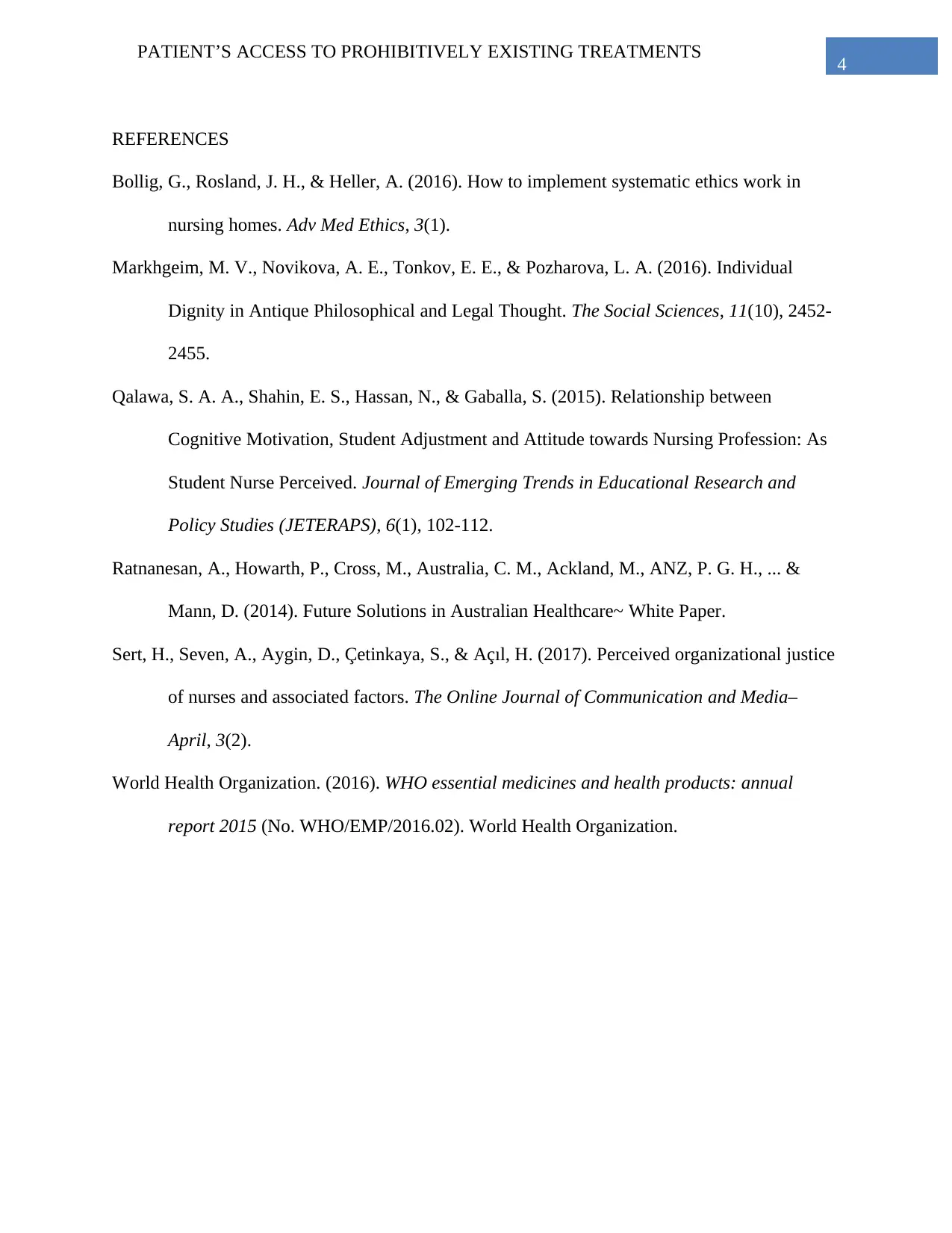
4
PATIENT’S ACCESS TO PROHIBITIVELY EXISTING TREATMENTS
REFERENCES
Bollig, G., Rosland, J. H., & Heller, A. (2016). How to implement systematic ethics work in
nursing homes. Adv Med Ethics, 3(1).
Markhgeim, M. V., Novikova, A. E., Tonkov, E. E., & Pozharova, L. A. (2016). Individual
Dignity in Antique Philosophical and Legal Thought. The Social Sciences, 11(10), 2452-
2455.
Qalawa, S. A. A., Shahin, E. S., Hassan, N., & Gaballa, S. (2015). Relationship between
Cognitive Motivation, Student Adjustment and Attitude towards Nursing Profession: As
Student Nurse Perceived. Journal of Emerging Trends in Educational Research and
Policy Studies (JETERAPS), 6(1), 102-112.
Ratnanesan, A., Howarth, P., Cross, M., Australia, C. M., Ackland, M., ANZ, P. G. H., ... &
Mann, D. (2014). Future Solutions in Australian Healthcare~ White Paper.
Sert, H., Seven, A., Aygin, D., Çetinkaya, S., & Açıl, H. (2017). Perceived organizational justice
of nurses and associated factors. The Online Journal of Communication and Media–
April, 3(2).
World Health Organization. (2016). WHO essential medicines and health products: annual
report 2015 (No. WHO/EMP/2016.02). World Health Organization.
PATIENT’S ACCESS TO PROHIBITIVELY EXISTING TREATMENTS
REFERENCES
Bollig, G., Rosland, J. H., & Heller, A. (2016). How to implement systematic ethics work in
nursing homes. Adv Med Ethics, 3(1).
Markhgeim, M. V., Novikova, A. E., Tonkov, E. E., & Pozharova, L. A. (2016). Individual
Dignity in Antique Philosophical and Legal Thought. The Social Sciences, 11(10), 2452-
2455.
Qalawa, S. A. A., Shahin, E. S., Hassan, N., & Gaballa, S. (2015). Relationship between
Cognitive Motivation, Student Adjustment and Attitude towards Nursing Profession: As
Student Nurse Perceived. Journal of Emerging Trends in Educational Research and
Policy Studies (JETERAPS), 6(1), 102-112.
Ratnanesan, A., Howarth, P., Cross, M., Australia, C. M., Ackland, M., ANZ, P. G. H., ... &
Mann, D. (2014). Future Solutions in Australian Healthcare~ White Paper.
Sert, H., Seven, A., Aygin, D., Çetinkaya, S., & Açıl, H. (2017). Perceived organizational justice
of nurses and associated factors. The Online Journal of Communication and Media–
April, 3(2).
World Health Organization. (2016). WHO essential medicines and health products: annual
report 2015 (No. WHO/EMP/2016.02). World Health Organization.
1 out of 5
Related Documents
Your All-in-One AI-Powered Toolkit for Academic Success.
+13062052269
info@desklib.com
Available 24*7 on WhatsApp / Email
![[object Object]](/_next/static/media/star-bottom.7253800d.svg)
Unlock your academic potential
Copyright © 2020–2026 A2Z Services. All Rights Reserved. Developed and managed by ZUCOL.





